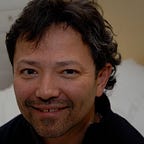Creative Philosophy, Part 1
Gilles Deleuze on philosophy, art and science.
For Gilles Deleuze, philosophy is a creative activity.
In their book, What Is Philosophy? Gilles Deleuze, and his later collaborator, Felix Guattari, identify philosophy, art and science as the three primary disciplines that analyze reality, each in its own specific way.
Deleuze and Guattari argue that all three disciplines involve the activity of thought, and are a matter of creation. What is distinguishing between each is the focus and manner in which that creativity takes place. Philosophers create “concepts,” whereas artists create sensible aggregates of “percepts” or “affects,” and scientists create “functions.”
Concepts
Concepts are subject to interpretation, evolve, have no fixed meaning, but attempt to explain reality in real terms. The concepts which philosophers create are multiplicities, composed of singularities.
Percepts or affects are novel combinations of sensation and feeling. Painters think in terms of lines and colors, musicians think in sounds, writers think in words, filmmakers in images, each of which interact at the level of the senses.
The work of art is a being of sensation and nothing else: it exists in itself. (What is Philosophy?)
Finally, functions are quantitative theories based on fixed points of reference such as the speed of light or absolute zero. Functions are propositional and measure things from this fixed point of reference.
To Create on an Open Plane
All three, concepts, percepts / affects and functions, are matters of creation and exist on an undifferentiated plane. The philosopher, artist and scientist must be free to create on an open plane without intrusion of external rules that would attempt to organize or stratify their plane.
The plane of immanence of the philosopher, the plane of composition of the artist and the plane of reference of the scientist are from all perspectives opposed to transcendence. The plane is not immanent to anything, but is itself, pure immanence.
None of these disciplines enjoys primacy over the others. For Deleuze, they are simply different ways of expressing metaphysical flux:
Separate melodic lines in constant interplay with one another. (Nietzsche and Philosophy)
Deleuze does not believe any of these disciplines are aimed at discovering truth, the “what is” of reality. Instead, all are expressions of that reality, manifestations of free thought expressed in their own unique ways.
The only questions that should be asked should be functional or practical: “what does it do?” or “how does it work?”
All three activities are attempts to grapple with what at first glimpse is chaos, the pure change of the universe. At the deepest level, the commonality the activities of philosophers, artists and scientists have is that they operate at the level of the virtual. They create by participating in the pure process of difference itself. Each provides:
A point of reference from which to assess and explore the resonances and exchanges — the becomings — that take place between these three domains… (Daniel Smith, Essays on Deleuze)
Concepts as Virtual
Insofar as Deleuze’s philosophy is a philosophy of difference, concepts cannot have an identity of their own, which would defeat the entire nature of his project. Concepts must themselves have a differential status.
In Deleuze’s view, concepts are what a philosopher does, nothing more. There is no objective concept that can be elevated to the level of truth at a static moment in history. The history of philosophy, for Deleuze, has no static quality that can be traced from past to present.
Concepts are vital, they create a reality between themselves and their objects of reference. And concepts are self-referential, sets of singularities connecting and forming multiplicities:
Every creation is singular, and the concept as a specifically philosophical creation is always a singularity. The first principle of philosophy is that Universals explain nothing but must themselves be explained. (What is Philosophy?)
Folds in the universe are singularities. No two folds are folded in the same way. They are everywhere but are not universal. They are differentiators of the universe.
Concepts move through the virtual taking on new forms in new circumstances.
I hope you enjoyed this article. Thanks for reading!
Tomas
Please join my email list here or email me at tomas@tomasbyrne.com.
Excerpt from my forthcoming book, Becoming: A Life of Pure Difference (Gilles Deleuze and the Philosophy of the New) Copyright © 2021 by Tomas Byrne. Learn more here.
